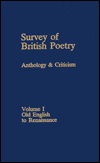

 |

|

The average rating for Survey of British poetry based on 2 reviews is 3 stars.
Review # 1 was written on 2009-05-06 00:00:00 Frederick Bradley Frederick Bradley"Children always seem to find Surprises of the nicest kind That bring a smile and make them say, 'It's such a lovely day today!'" —Surprising Pictures for Little Folk I would give this book one and a half stars. Perhaps the most saliently interesting aspect of this unusual picture book is the fact that it was originally published such a relatively long time ago, in the late 1800's. Ernest Nister had an intriguing and unique idea going with these "Revolving Picture" books, especially for his time period. The tabs that allow the pictures to move have not held up well in the copy that I have; in fact, I am unable anymore to work ANY of the tabs. We always used to enjoy moving the pictures, though, and the accompanying poems of Ernest Nister flow well. |
Review # 2 was written on 2021-01-04 00:00:00 Alexandre munier Alexandre munier“Am not I A fly like thee? Or art not thou A man like me?” Out of all the poetry I have read, these four lines are amongst my favourite. They have stuck with me over several years and seem to resonate within me. I’ve even considered having them tattooed onto my arm. Why these lines? You may ask. It’s simple really: they say so much. Different readings can be made here, but the one I see most strongly is man talking to nature. Man questions it; he asks if he is the same as nature and if nature is the same as him. Is not the fly equal to him? Is not the fly’s life just as valuable as his own? All life is precious, and what I read here is a man coming to the realisation that this is so. Nature is valuable, and no matter how high man may place himself all life remains the same; it is the same force: the same energy. It could also be a bourgeoisie facing a member of the lower class and realising the same thing, but I prefer to stick with the human to animal relationship. Nature is huge, the ecosystem is huge. And, again, no matter how high man may place himself he is still just another cog on an ever turning mechanism. In the modern world he has damaged the system, the environment, but he is still part of a greater whole. And his part is no more important than that of the rest of the cogs. What I read in Blake’s words is an ideal, a projection of a semi-paradise; one man can perhaps reach if when he has gained experience he remembers where he came from: his innocence. Blake’s poetry is marvellously deceptive; it appears so simple, but that’s the beauty of it. Hidden behind the seemingly innocent childlike songs is a sense of irony, sarcasm and genius. The speakers of the poems describe the world as they see it; it is a mere reflection of their own limited perceptions; they see the world through a childlike and predetermined state. In essence, they see what they are meant to see, and nothing beyond that. Well, not until they gain experience and look back on their own folly. Even at this stage, Blake portrays the duality of the human soul; the two states coexist and inform each other. From this collection of poetry I’m left with the impression that these two stages are necessary for human development, but not exclusively so; it’s like Blake is suggesting that one should be able to see the world as an aspect of both. Throughout the poetry Blake also questions the meaning of standard religion and proposes his own ideas of a more natural approach to divinity. He believed that the gods existed within the bosom of man, and not in an exogenous limited interpretation. In this, he is a true Romantic poet. The more poetry I read in this age, the more I come to appreciate this idea. Blake’s poetry stands out amongst the crowd though. He used a completely unique style to get his the two states of the human soul across to the reader. But, again, he reflects the movement; his poems have a heavy emphasis on the freedom of self-expression and can only really be appreciated in conjunction with the plates he engraved them on. He was a true artist: "Tyger Tyger, burning bright, In the forests of the night; What immortal hand or eye, Could frame thy fearful symmetry?" Indeed, for me, the comparison between the “Lamb” and the “Tyger” cannot be appreciated without looking at the images. The two poems are not simply about different animal types. They are about good and evil; they are a comparison of the badness and benevolence of humankind. The lamb represents the most profound sense of inexperience; it is innocence and pure: it is docile and vulnerable in its infancy. In this it is comparable to the Christian saviour: it is the best degree of humanity. The Tyger, on the other hand, has a corrupt heart. He represents the negative aspects of humankind, and can be interpreted as part of industrialisation, commerce and power. Through this comparison the narrator of the poems questions how a creator could forge two opposing states. What is the purpose of such a thing? When the experience section has been read, it is vital to go back and look at innocence. It changes the nature of the poems, as the implicit becomes explicit. The layers of meaning are multiple and complex. I could spend a day pondering over some of them, but for me the most memorable one is “the fly” for the reasons I discussed: it will always stay with me. |
CAN'T FIND WHAT YOU'RE LOOKING FOR? CLICK HERE!!!